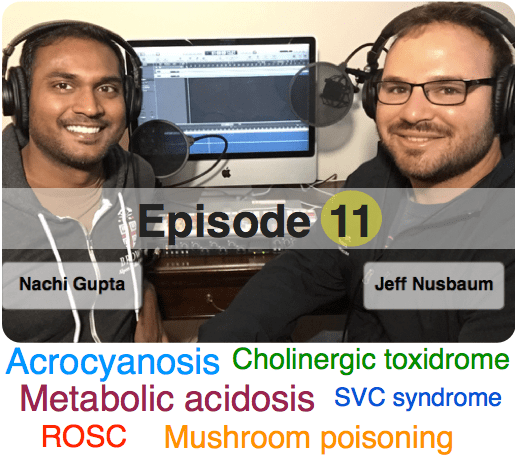Podcast Ep 11: SVC Syndrome, Metabolic Acidosis, ROSC, & More

If you set your goals ridiculously high and it’s a failure, you will fail above everyone else’s success. -James Cameron
Welcome back to Episode 11! Hope you all had a fantastic holiday and New Year’s break. With the In-Training Exam (ITE) just a few months away, it is time to kick the studying into high gear!
We changed the brief initial Rapid Review to cover topics from all prior episodes for better spaced repetition. In this episode, we go over important mnemonics. Consider pausing the podcast briefly and quizzing yourself as you are listening. Do not forget to check out the blog for the other episodes as well as a few new Rosh Quizzes. Lastly, learn some tricks from the high-scoring test-taker Ryan Ribeira, MD.

- For acute lithium ingestions, a concentration of 4 mEq/L or greater requires emergent dialysis. In chronic lithium ingestions, a level of greater than 2.5 mEq/L requires emergent dialysis. Additionally, any patient with neurologic findings secondary to the ingestion requires treatment.
- Lead poisoning is treated with either succimer or IV EDTA. Remember the mnemonic “it sucks to eat lead.”
- For wide complex tachydysrhythmia in a patient presenting with an amphetamine overdose, you should administer sodium bicarbonate. Do not forget to address the agitation with benzodiazepines and the hyperthermia with cooling, which will also help control symptoms.
Now onto this week’s podcast
Question 1
An 88-year-old man with Parkinson’s disease presents confused. He is using a rivastigmine patch as part of his therapy but has mistakenly put on five patches. What physical examination finding would you expect to see in this patient?
A. Constipation
B. Dry skin
C. Lacrimation
D. Mydriasis
Question 2
What is the most common cause of superior vena cava syndrome?
A. Goiter
B. Indwelling central venous catheter
C. Malignancy
D. Thrombosis
Question 3
A pH of 7.1, HCO3 of 15 and PCO2 of 30 is best described by which of the following primary acid-base disorders?
A. Metabolic acidosis
B. Metabolic alkalosis
C. Respiratory acidosis
D. Respiratory alkalosis
Question 4
Which of the following is true in the post-cardiac arrest patient who experiences a return of spontaneous circulation (ROSC)?
A. Antiplatelet and anticoagulant therapy should be avoided in post-arrest patients
B. Post arrest angioplasty or stenting of acute coronary lesions with a normal ECG has been shown to be an independent predictor of survival after cardiac arrest
C. Post arrest prophylactic antiarrhythmic therapy has been shown to reduce adverse events
D. There is no proven benefit to therapeutic hypothermia
Question 5
A mother delivered a full-term boy in the ED about 30 minutes ago. On exam, he has cyanosis of the distal extremities, as seen above. His mucous membranes and trunk are pink, and he has +2 distal pulses. No murmurs are heard. His remaining physical exam was normal. Which of the following is most likely his pulse oximetry reading?
A. 64–73%
B. 74–83%
C. 84–93%
D. 94–100%
Question 6
A 53-year-old man presents to the emergency department with vomiting, diarrhea, and abdominal cramping which occurred 1 hour after eating a meal prepared from mushrooms he found growing in the forest. Which of the following most predicts a benign course of disease?
A. Absence of neurologic symptoms
B. Dots or scales on the cap of the mushroom
C. Normal serum liver function tests on initial presentation
D. Symptoms occurring within 2 hours of ingestion

- The cholinergic toxidrome is marked by salivation, lacrimation, urination, defecation, GI upset, and emesis. The most deadly symptoms can be remembered by the killer “B”s: bronchorrhea, bronchospasm, and bradycardia.
- The anticholinergic toxidrome is marked by hyperthermia, mydriasis, dry mouth, urinary retention, and confusion.
- Bronchogenic carcinoma, small cell lung cancer, squamous cell lung cancer, and lymphoma are all common malignancies that can cause SVC syndrome.
- Dyspnea is the most common presenting symptom of SVC syndrome.
- In a metabolic acidosis, you can use Winters’ Formula, which dictates that the pCO2 should be 1.5 times the bicarbonate +8 +/- 2 for appropriate respiratory compensation.
- The mnemonic MUDPILES can be used to remember many of the common causes of anion gap metabolic acidosis: Methanol, Uremia, DKA, Propylene glycol, Iron or INH, Lactic acidosis, Ethylene glycol, and Salicylates.
- For the causes of non-anion gap metabolic acidosis remember HARDASS: Hyperalimentation, Addison’s disease, RTA, Diarrhea, Acetazolamide, Spironolactones, and Saline infusion.
- In patients with post-cardiac arrest ROSC, cardiac catheterization should be considered even in the setting of a normal EKG.
- In cardiac arrest, Automated External Defibrillator (AED) use, early bystander CPR, Amiodarone in shock-resistant ventricular tachycardia or ventricular fibrillation, and therapeutic hypothermia are all proven interventions to improve outcomes.
- Acrocyanosis is a transient blue discoloration of the hands and feet, which can occur when a newborn is cold. Typically the pulse oximetry reading is normal.
- Amanita mushrooms produce a deadly renal and hepatic toxin: the amatoxin.
- Amatoxin poisoning leads to 4 stages of symptoms culminating in liver failure. Mortality is commonly cited as 10-30%. Activated charcoal and hemoperfusion can be considered.
- The Amanita genus of mushrooms can be identified by dots or scales on their cap.
From Post-ROSC cardiac care to toxic mushroom ingestion, this concludes episode 11. Let us know how to make this even better by sending Please send feedback to Roshcast@roshreview.com — we want to hear your feedback to keep improving this podcast. Do not forget to check out the high-yield questions and explanations in the Rosh Review Emergency Medicine Qbank.
Until next time,
Jeff and Nachi
P.S. If you missed last week’s episode on spider bites, you can catch up here:





Comments (0)